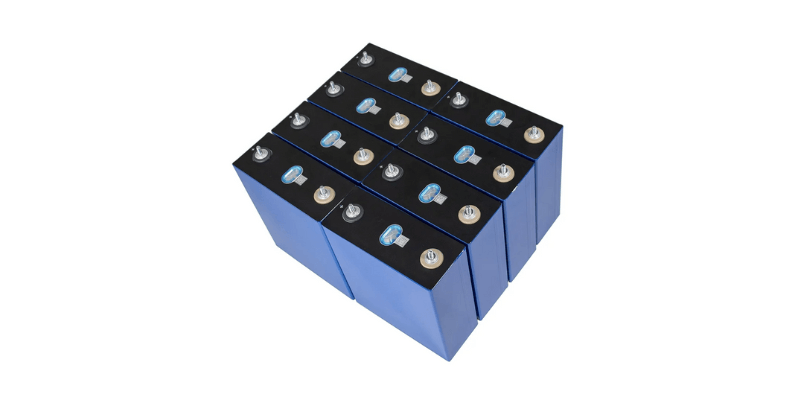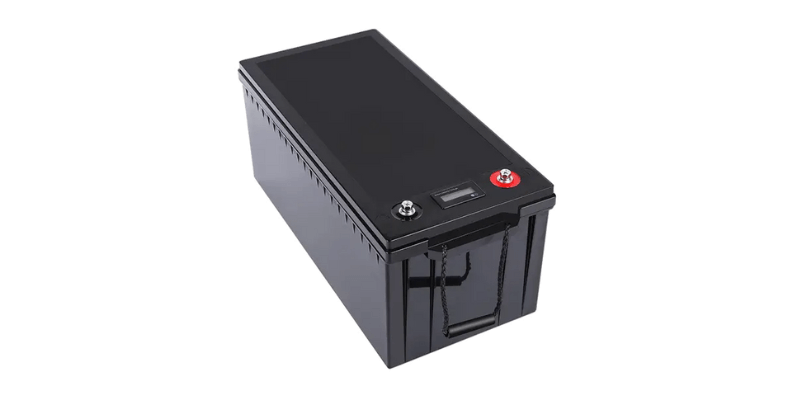LiFePO4-batterijenof LFP -batterijen transformeren de batterij -industrie. Dus, waar staat LifePo4 precies voor, en welke voordelen deze lithiumijzerfosfaatbatterijen bieden voorbij Andere typen? Ze zijn niet hetzelfde als gewone lithium-ionbatterijen.)
Blijf lezen om meer te weten te komen!
Wat zijn LIFEPO4 -batterijen?
LIFEPO4-batterijen, gemaakt van lithiumijzerfosfaat, zijn niet-toxisch, niet-contaminerend en bevatten geen zeldzame aardmetalen, waardoor ze een milieuvriendelijke keuze zijn.
Een korte geschiedenis van de LifePo4 -batterij
De ontwikkeling van LifePo4 -batterijen heeft een interessante geschiedenis:
- Vroeg onderzoek
In het midden van de jaren negentig was de groep van John B. Goodenough aan de Universiteit van Texas pionier met lithiumijzerfosfaat (LIFEPO4) als kathodemateriaal voor lithium-ionbatterijen.
- Uitdagingen overwinnen
LifePo4 worstelde aanvankelijk met een lage elektrische geleidbaarheid, die onderzoekers verbeterden door de deeltjesgrootte te verminderen en ze te coaten met geleidende koolstof.
- Commercialisering
Bedrijven zoals A123 Systems leidden vroege commercialisering, terwijl China aanzienlijk heeft bijgedragen aan de massaproductie en acceptatie in de elektrische voertuigensector.

LifePo4 versus lithium -ionbatterijen
LIFEPO4-batterijen zijn niet ideaal voor wearables zoals horloges omdat ze niet zoveel energie inpakken als lithium-ionen. Maar als het gaat om dingen zoals zonne -opstellingen, campers, golfkarretjes, basboten, semi-trucks en elektrische motorfietsen, ze zijn een totale overwinning. Waarom? Hier zijn de redenen:
Veiligheid en stabiliteit
LIFEPO4 -batterijen zijn behoorlijk geweldig als het gaat om veiligheid, dankzij hun stabiele chemie. Deze batterijen op basis van fosfaat hebben eersteklas thermische en chemische stabiliteit, waardoor ze veiliger zijn dan andere lithium-ionopties. Bovendien vangen lithiumfosfaatcellen niet gemakkelijk in brand, dus ze zijn een veiliger gok als er iets misgaat tijdens het opladen of ontladen. Ze kunnen ook moeilijke omstandigheden aan, zoals extreme temperaturen en hobbelige ritten, zonder zweet te breken.
Milieu-impact
LIFEPO4-batterijen zijn een milieuvriendelijke optie omdat ze niet-giftig zijn, niet vervuilen en geen zeldzame aardmetalen gebruiken. Aan de andere kant zijn lithiumbatterijen van loodzuren en nikkeloxide niet zo geweldig voor het milieu. Vooral loodzure kan riskant zijn omdat ze kunnen lekken naarmate hun chemicaliën in de loop van de tijd afbreken.
Prestatie
Als u op zoek bent naar een veilige, niet-giftige batterij die echt levert, zijn LIFEPO4-batterijen de juiste keuze. Overweeg deze indrukwekkende functies: ze laden volledig op in 2 uur of minder, hebben een laag zelfontladingspercentage van slechts 2% per maand (veel beter dan de 30% met loodzuurbatterijen) en bieden een langere runtime in vergelijking met beide lood- Zuur en andere lithiumopties. Bovendien bieden ze consistent vermogen, zelfs wanneer ze onder de helft geladen zijn. En het beste deel? Geen onderhoud vereist!
Ruimte -efficiëntie
LifePo4 -batterijen zijn superieur vanwege hun lichtgewicht ontwerp – 50% lichter dan lithiummangaanoxidebatterijen en tot 70% lichter dan loodzuurbatterijen. Dit vermindert het gasverbruik en verbetert de manoeuvreerbaarheid van het voertuig, terwijl hun compacte grootte ruimte bevrijdt in scooters, boten, campers en industriële toepassingen.

LIFEPO4-batterijen versus niet-lithiumbatterijen
LIFEPO4-batterijen verhogen de lat aanzienlijk in vergelijking met lithium-ion en andere oplaadbare opties.
LifePo4 -batterijen versus loodzuurbatterijen
Loodzuurbatterijen zijn aanvankelijk goedkoper, maar ze vereisen veel onderhoud en frequente vervangingen. LifePo4-batterijen daarentegen duren 2-4 keer langer en hebben weinig onderhoud nodig.
LifePo4 -batterijen versus gelbatterijen
Net als LIFEPO4 hebben gelbatterijen niet constant opgeladen of laad het laad af wanneer ze worden opgeslagen. Ze laden echter langzaam op en u moet ze eenmaal vol koppelen om schade te voorkomen.
LifePo4 -batterijen versus AGM -batterijen
AGM -batterijen kunnen duur zijn en kunnen beschadigd raken als ze onder de 50%worden afgevoerd. Met LifePo4 kunt u ze volledig ontladen zonder zich zorgen te maken over schade.

Beste toepassingen voor LifePo4 -batterijen
LIFEPO4-batterijen zijn perfect voor wanneer u iets veilig, langdurig en goed presteert. Bekijk waar ze echt schitteren:
Opslag van hernieuwbare energie
LIFEPO4 -batterijen bewaren energie effectief uit zonnepanelen en windturbines, waardoor betrouwbaar vermogen wordt gewaarborgd tijdens perioden met een lage generatie. Home Energy Storage Systems (HESS) stellen huiseigenaren in staat om overtollige zonne -energie op te slaan voor piekvraag- of rasteruitval.
Elektrische voertuigen (EV's)
Voor personenauto's worden LIFEPO4 -batterijen steeds populairder omdat ze veilig zijn en lang duren. En als het gaat om bedrijfsvoertuigen zoals bussen en vrachtwagens, maken LIFEPO4 -batterijen ook zeker hun stempel.
Mariene toepassingen
LIFEPO4 -batterijen houden alle ingebouwde systemen soepel, hanteren de voortstuwing en zorg voor extra uitrusting. Het speelt ook een grote rol in offshore windparken en andere coole mariene energieprojecten.
Campers en recreatieve voertuigen
LIFEPO4 -batterijen kunnen betrouwbaar vermogen bieden van lichten en koelkasten naar AC en alle andere coole spullen aan boord.
Back -up Power Systems
Voor UPS zorgen LifePo4 -batterijen voor continu vermogen voor kritieke apparatuur tijdens stroomuitval. En voor datacenters? Ze zorgen ervoor dat servers en andere vitale spullen worden ingeschakeld, wat er ook gebeurt.
Industriële toepassingen
Materiaalbehandelingsapparatuur: vorkheftrucks, palletjacks en andere industriële voertuigen voeden.
Telecommunicatie: gebruikt in basisstations en andere telecommunicatie -infrastructuur.

FAQ's over LifePo4 -batterijen
Kan LifePo4 brand vatten?
De LIFEPO4-batterij presteert beter dan lithium-ionbatterijen in de levensduur van de cyclus (4-5 keer langer duren) en veiligheid. Dit voordeel is cruciaal, omdat lithium-ionbatterijen oververhit kunnen raken en in brand kunnen vallen, terwijl LifePo4 dat niet doet.
Waarom is LifePo4 zo duur?
LIFEPO4 -batterijen zijn aanvankelijk duurder, maar op de lange termijn goedkoper vanwege hun levensduur. Hoewel gemaakt van duurdere materialen, hebben ze de voorkeur voor verschillende voordelen: ze zijn lichter dan loodzuurbatterijen, veiliger, gaan langer mee en vereisen geen onderhoud.
Is LifePo4 hetzelfde als lithiumion?
Echt niet! De LIFEPO4-batterij duurt meer dan vier keer langer dan gewone lithium-ionbatterijen.
Kan ik mijn LifePo4 -batterij op de lader laten?
Als uw LIFEPO4 -batterijen worden geleverd met een batterijbeheersysteem, hebt u geluk – Het belet uw batterij niet overladen.


